 Belief Dances
Belief Dances
Yunnan Volume: Dongba Dance of the Naxi Ethnic Group
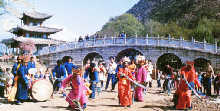 Dongba Dance is an indispensable part of the rituals of chanting scriptures or praying the god of the Dongba religions of the Naxi ethnic group. The aim of this dance is to drive the devils away, so the dancing atmosphere are very the movements calm and stable. Dongba Dance belongs to the kind of primitive religious dance category and has a wide range of contents which fall into seven categories: Sacrifice to the Wind, Remove the Disasters, Sacrifice to the Moutain God and theDragonKings, Remove the Dirt, Start a Funeral, Recommendation and Praying for Longevity.
Dongba Dance is an indispensable part of the rituals of chanting scriptures or praying the god of the Dongba religions of the Naxi ethnic group. The aim of this dance is to drive the devils away, so the dancing atmosphere are very the movements calm and stable. Dongba Dance belongs to the kind of primitive religious dance category and has a wide range of contents which fall into seven categories: Sacrifice to the Wind, Remove the Disasters, Sacrifice to the Moutain God and theDragonKings, Remove the Dirt, Start a Funeral, Recommendation and Praying for Longevity.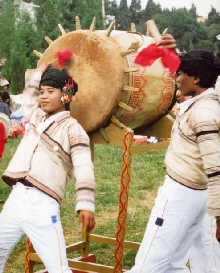
Yunnan Volume: Big Drum Dance of the Jinuo Ethnic Group
Big Drum Dance, popular in the Jinuo ethnic group ofYunnan Province, could be traced back to the ancestral sacrifice, family sacrifice, and house-building celebration. This dance is unrestrained, calm, stimulating and well combining both softness and hardness.
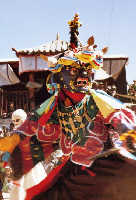 Tibet Volume: Qiangmu of the Tibetan Ethnic Group
Tibet Volume: Qiangmu of the Tibetan Ethnic Group
Qiangmu, a religious dance of TibetanBuddhism, is indeed a well established performing art form com- bining scripture chanting in perfect unison with music and dance, and performed in thetemples by the monks with solemn and splendid atmospheres.
Qiangmu consist of A Qiangmu and Copper Qiangmu while the former is very slow and moderate with drum music as its main accompaniment and the latter very passionate and unstrained with copper wind in-strument music.
XinjiangVolume; Shaman Dance of the Xibo Ethnic Group
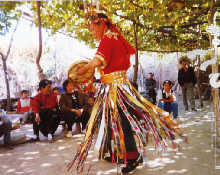 Xibo ethnic group once believed in Shamanism, whose abbot is called "Shaman", who spreads his religion of nature worship and polytheism in the form of his Lamaist God Dance which gradually develops into this Shaman Dance. Generally performed by a single dancer, it is integrated with singing with distinctive characters as simple, vivid, forceful, and vigorous. Influenced by Beilun, another folk dance of the Xibo ethnic group, it's characterized by those movements as shaking shoulders, stepping, hopping, etc.
Xibo ethnic group once believed in Shamanism, whose abbot is called "Shaman", who spreads his religion of nature worship and polytheism in the form of his Lamaist God Dance which gradually develops into this Shaman Dance. Generally performed by a single dancer, it is integrated with singing with distinctive characters as simple, vivid, forceful, and vigorous. Influenced by Beilun, another folk dance of the Xibo ethnic group, it's characterized by those movements as shaking shoulders, stepping, hopping, etc.
Hubei Volume: Hand-Waving Dance of the Tujia Ethnic Group
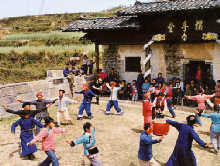 Hand-Waving Dance, also called Shebari in the Tujia' s language, is a belief dance for a ritual of sacrificing ancestors and popular in the congregated residences of the Tujia ethnic group in Hunan andHubei Provinces andChongqingCity as well.
Hand-Waving Dance, also called Shebari in the Tujia' s language, is a belief dance for a ritual of sacrificing ancestors and popular in the congregated residences of the Tujia ethnic group in Hunan andHubei Provinces andChongqingCity as well.
When dancing, all the dancers form a circle on the ground with the Tima (wizard) leading at the front, and dance with their armsswingingfreely and legs following all kinds of floor patterns to the music of drums and gongs. As the dancers constantly keep waving their arms in all directions, the dance is called "Waving Hand Dance". The dance has got two kinds according to it's scales: while the large one is usually joined by several thousands of people at the ritual sacrificing "the Great King of Eight Tribes" who is the ancestor of the Tujia ethnic group as a whole, the small one participated by much less people in memory of "Penggong Juezhu" who is the ancestor of some families. Indeed, this dance displays the history and life of the Tujia ethnic group and could be regarded as a splendid historical epic.
Qinghai Volume: Yutu (TigerDance) of the Tu Ethnic Group
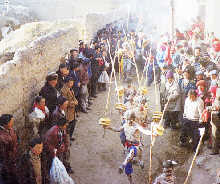 Yutu is the another of tiger and this dance is a folk dance dispelling the evils and praying the god for peace, and popular among the Tu ethnic group ofTongrenCounty inQinghai Province. On the twentieth day of the eleventh lunar month of each year and after a special sacrifice ritual, seven chosen men dressed up as tigers, on hearing the gunfire, rush down the mountain in panic and fmally into the village going through the streets and even the houses for the purpose of "sucking the evil spirit" away from all the houses and the patients. The sharp contrast is that the dance is quite solemn at the ritual of the Eriang (a Chinese god) Temple while unstrained and barbaric when the dancers entering the village, mischievous and funny when jumping over the walls and taking away the food with their mouths; unrestrained and bold once again when dancing in village.
Yutu is the another of tiger and this dance is a folk dance dispelling the evils and praying the god for peace, and popular among the Tu ethnic group ofTongrenCounty inQinghai Province. On the twentieth day of the eleventh lunar month of each year and after a special sacrifice ritual, seven chosen men dressed up as tigers, on hearing the gunfire, rush down the mountain in panic and fmally into the village going through the streets and even the houses for the purpose of "sucking the evil spirit" away from all the houses and the patients. The sharp contrast is that the dance is quite solemn at the ritual of the Eriang (a Chinese god) Temple while unstrained and barbaric when the dancers entering the village, mischievous and funny when jumping over the walls and taking away the food with their mouths; unrestrained and bold once again when dancing in village.
